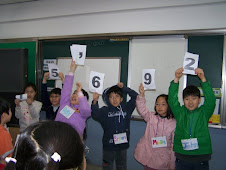Grade Level/Subject: 4th Grade/Science
Type of Lesson: Experiment
Materials: Vocabulary Cards with English/Korean, test tubes with stoppers, test tube racks, cooking oil, colored water, eye droppers, Water and Oil PowerPoint
Objectives:
1. Students will be able to follow the procedure to complete the mixing and separating of oil and water experiment
2. Students will be able to demonstrate that some materials do not mix such as in the case of water and oil.
3. Students will be able to demonstrate that it is difficult to remove oil from an oil and water mixture.
Anticipatory Set:
Begin class by asking the question, “Can all liquids be mixed together?” Discuss the student responses.
Explain that today we are going to do an experiment to see if two specific liquids can form a mixture.
Post the new vocabulary on the board (water, oil, density) and have the students say the new vocabulary words aloud at least three times.
Actual Lesson:
Attempt to Mix Water and Oil Experiment
o The students will work in groups of four to perform this experiment.
o Have the students pour oil into a test tube until it is 1/4 full.
o Next, the students will add colored water to the test tube until it is 1/2 full.
o The students will not put the stopper into the test tube and each group member will shake the test tube for 10 seconds, so that the mixture has been shaken a total of 40 seconds. The test tube should then be placed in the test tube rack and the students will observe the mixture for one minute.
o Discuss with the students what they observe. Be sure to point out that the oil was poured in first, so it started out in the bottom of the tube, but now the water is at the bottom. Ask the students why they believe this happened?
o Explain the concept of density (the amount of mass an object has in relationship to the volume). Explain that equal amounts of water and oil were poured into the test tube, but one sank to the bottom. This is because the water is denser; it is heavier than the oil. Explain that because the density of the two liquids is so different, they will not mix.
Water and Oil PowerPoint
o Ask the students to think of a time when they saw oil and water not mixing in real life. Tell the students that they can see real life occurrences of water and oil not missing and these are provided in the PowerPoint.
o The final example from the PowerPoint of water and oil not mixing is in the case of oil spills. There are several pictures from the recent oil spill of Taean, which is only 170km SW of Korea.
o Explain what an oil spill is to the students and then ask them if they know why oil spills are so horrible.
Attempt to Clean Up an Oil Spill Activity
o Tell the students that we are going to pretend in our test tubes we have an oil spill. The colored water is going to represent the ocean and the cooking oil will represent oil. Give the students the task of removing all of the oil from their “ocean.” They can use the eye dropper or pour the oil out. Instruct them to alert you when they complete this task.
o This is an impossible task. The students will keep saying they have all the oil removed, but when they call you over you can find little drops of oil and tell the students that they have not removed it all.
o Let the students continue to attempt to remove the oil for about 7-9 minutes.
o Discuss with the students that it is impossible to remove every drop of oil from an oil spill. That is why they are so horrible, because once the oil has entered the ocean some of it will remain there forever.
Check for Understanding:
· What happens to the water and oil when they were shaken to be mixed together?
· Which one is denser: water or oil? How do you know this?
· Where can you find real life occurrences of water and oil not mixing?
· Why are oil spills such a dangerous situation?
Guided Practice:
The teacher helps lead the students through the experiment verbally and will provide physical assistance if needed.
Independent Practice:
The students complete the steps of the experiment themselves, but may ask for assistance if needed.
Closing:
Review the new English vocabulary words. Have the students repeat after you at least three times.
Have the students explain what happened during the experiment to the oil and the water.
Extended Practice:
Have the students research an oil spill and write a short paper about the effects of the oil spill and how people removed the oil.


No comments:
Post a Comment